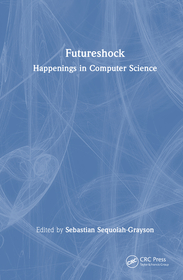
Futureshock
Happenings in Computer Science
-
10% KEDVEZMÉNY?
- A kedvezmény csak az 'Értesítés a kedvenc témákról' hírlevelünk címzettjeinek rendeléseire érvényes.
- Kiadói listaár GBP 64.99
-
31 048 Ft (29 570 Ft + 5% áfa)
Az ár azért becsült, mert a rendelés pillanatában nem lehet pontosan tudni, hogy a beérkezéskor milyen lesz a forint árfolyama az adott termék eredeti devizájához képest. Ha a forint romlana, kissé többet, ha javulna, kissé kevesebbet kell majd fizetnie.
- Kedvezmény(ek) 10% (cc. 3 105 Ft off)
- Kedvezményes ár 27 944 Ft (26 613 Ft + 5% áfa)
Iratkozzon fel most és részesüljön kedvezőbb árainkból!
Feliratkozom
31 048 Ft

Beszerezhetőség
Becsült beszerzési idő: A Prosperónál jelenleg nincsen raktáron, de a kiadónál igen. Beszerzés kb. 3-5 hét..
A Prosperónál jelenleg nincsen raktáron.
Why don't you give exact delivery time?
A beszerzés időigényét az eddigi tapasztalatokra alapozva adjuk meg. Azért becsült, mert a terméket külföldről hozzuk be, így a kiadó kiszolgálásának pillanatnyi gyorsaságától is függ. A megadottnál gyorsabb és lassabb szállítás is elképzelhető, de mindent megteszünk, hogy Ön a lehető leghamarabb jusson hozzá a termékhez.
A termék adatai:
- Kiadás sorszáma 1
- Kiadó CRC Press
- Megjelenés dátuma 2025. augusztus 29.
- ISBN 9781032702742
- Kötéstípus Keménykötés
- Terjedelem192 oldal
- Méret 234x156 mm
- Súly 520 g
- Nyelv angol
- Illusztrációk 63 Illustrations, black & white; 39 Halftones, black & white; 24 Line drawings, black & white 691
Kategóriák
Rövid leírás:
This book provides an accessible introduction to leading edge topics today, from AI ethics and cybersecurity, through to augmented realities, virtual interfaces, and much more. This collection of writings by experts in their respective fields, invites the reader to explore new worlds that race towards us.
TöbbHosszú leírás:
From AI ethics and cybersecurity to augmented realities, virtual interfaces, and much more, Futureshock provides an accessible introduction to the leading edge topics of today. This collection of writings by experts in their respective fields, invites the reader to explore new worlds that race towards us. This book serves as a map that shows the reader to access vantage points of understanding from which the new digital ecosystem may be seen with clarity. It does not presume any in-depth knowledge on behalf of the reader. Topics are covered things from a conceptual angle, with the relevant conceptual architecture introduced without any need for a strong background in abstract mathematics.
The common thread of the topics of this book is the new technologies, their environments and the user engagement and experience with them. There is a broad coverage of topics pertaining to learning, design, education, metaverse, engineering, cybersecurity, and AI and ethics. It is organized independently and written purposively to enhance the reader’s conceptual literacy so that they may engage with future events in the field critically. By providing a view on the now and next across a broad range of areas, Futureshock is positioned as a springboard for discussion on these and related topics. An important topic on AI and ethics, shares about developing and deploying AI systems for social good, and considering the diverse and complex ethical challenges that arise.
This book serves the professionals working in their fields as they gain further insight into the new digital ecosystem. It would be of interest to a general audience that is keen to learn about the state of play in the technology space. It can also be used as a supplementary text for students in a course that looks at the current and future issues in computer science.
“As a Human-Computer Interaction researcher I often think about how we might improve the bandwidth to the brain. To me after-shocks helps us chart a bi-directional path first, from the human brain through interfaces, software and algorithms to the Hardware we rely on today. However you can read through the book, which outlines the risks and opportunities, as we move through Hardware failure, design thinking opportunities, risks and rewards in artificial intelligence such as using ripple down rules or computationally wasteful approaches, through to the rewards for education and finally to what cognitive load theory and Brain computer interfaces and a Metaverse might afford us as we try to cross the rubicon between the digital and the inputs to our brain.
Carefully constructed, this book will delight and possibly annoy you in equal measure, but one thing is certain, your thinking on why “computer science matters” will never be the same again.”
-Professor Aaron Quigley, Science Director and Deputy Director of CSIRO’s Data61
Több
Tartalomjegyzék:
1.Introduction 2. AI and Ethics 3. The Future of Education Technology 4. Exploring the integration of design thinking into the engineering discipline 5. How the metaverse and brain computer interfaces can revolutionise the education industry 6. UX design guided by cognitive load theory 7. Ripple Down Rules and Classification 8. Counterfeits and Kill Switches: How Hardware Security can Impact You
Több




